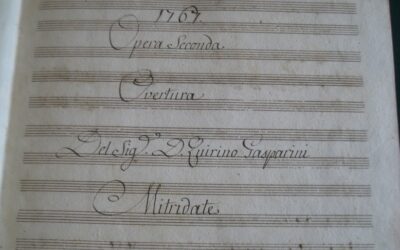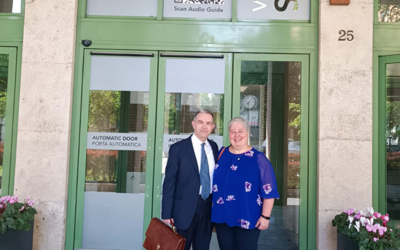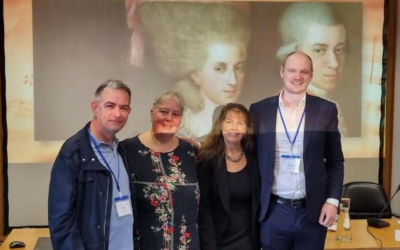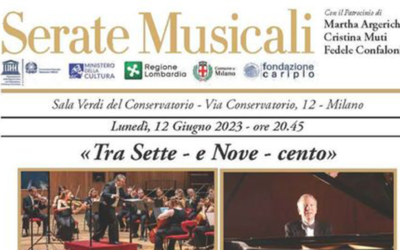Wolfgang Amadé Mozart
The Myth of Mozart's Childhood: Unmasking the Illusion
Mozart’s childhood is often romanticised, but behind the myth lies a more complex reality. This post explores the hidden dynamics within his family, questioning the traditional narrative of Mozart’s early years and shedding light on the forgotten role of his sister, Nannerl.
Mozart: The Fall of the Gods
This book offers a fresh and critical look at the life of Wolfgang Amadeus Mozart, challenging the myths that have surrounded him for centuries. We strip away the romanticised image of the “natural genius” and delve into the contradictions within Mozart’s extensive biographies. Backed by nearly 2,000 meticulously sourced citations, this work invites readers to explore a deeper, more complex understanding of Mozart. Perfect for those who wish to question the traditional narrative, this biography is a must-read for serious music lovers and historians.
“Mozart began to beat the keys on the harpsichord at three, play short pieces at four, and improvise Minuets at five. His father or sister copied the music that he was not yet able to compose. It is impossible to distinguish what actually came from his invention.”
Mozart: The Fall of the Gods
Mozart’s childhood is often shrouded in romanticised tales of prodigious talent and divine inspiration. Yet, when we look beyond the myths, a different picture begins to emerge—one that highlights contradictions and unspoken realities.
Born into a family where his father, Leopold, was a frustrated and unsuccessful composer, and his mother, Anna Maria, was of “Dinaric race” (as described by German nationalists), Wolfgang’s early years were shaped not by innate genius but by relentless familial expectations. Leopold’s ambition for fame found its outlet in his children, especially Wolfgang and his older sister Nannerl, who was also a talented musician, though her story has been largely overlooked.
Despite Nannerl’s early musical prowess, her contributions have faded into obscurity. Was she overshadowed by her younger brother, or simply a victim of the limitations placed on women in 18th-century society? Wolfgang himself once marvelled at one of her compositions, praising her talent, yet no trace of her work remains today. The focus on Mozart’s child prodigy image disregards the roles of those around him, particularly Nannerl, who may have played a significant part in shaping his development.
Mozart’s so-called “miraculous” early musical abilities were often exaggerated by biographers seeking to reinforce the myth of his genius. His father, keen to promote Wolfgang, carefully curated this image, often with the help of Nannerl, who would copy music that the young Mozart had yet to master. What remains unclear is how much of his early work was truly his own creation, and how much was a product of family collaboration.
You May Also Like
Quirino Gasparini’s Music Performed for the First Time
For the first time in modern history, Quirino Gasparini’s music has been performed. This concert, featuring arias from Mitridate and Beethoven’s Seventh Symphony, was conducted by Maestro Leonardo Muzii, with soprano Anastasiia Petrova.
Teaching Mozart at Bocconi University
We delivered a four-hour lecture on Mozart at Bocconi University, showcasing unpublished music by Gasparini, Gatti, and Tozzi while comparing textual and musical treatment with Mozart’s works. Unseen variants from Le Nozze di Figaro were also revealed.
New Revelations About Mozart at the Évora Forensic Conference
At the Évora Forensic Conference, new research confirmed that both Mozart’s personal catalogue and the signatures on his violin concertos are forgeries, challenging long-held beliefs.
Modern Premieres at Bayreuth
The modern premieres of Antonio Tozzi, Luigi Gatti, and Tommaso Traetta’s works at Bayreuth brought long-overlooked Italian composers back into the spotlight. These performances, transcribed and revised by Luca Bianchini and Anna Trombetta, have restored the place of these remarkable composers in music history.
Luchesi’s Concerto Revived at Milan’s Sala Verdi
A standing ovation followed the performance of our revised edition of Luchesi’s Concerto in F for piano and strings at the Sala Verdi in Milan, conducted by Maestro Giorgio Rodolfo Marini and performed by the Insubria Chamber Orchestra.
A Modern Premiere in Germany
Giovanni Pacini’s Medea, revised by Luca Bianchini and Anna Trombetta, made its modern premiere in Germany at the Theater für Niedersachsen. This monumental work was performed in full, marking a triumphant revival of Pacini’s forgotten genius.







